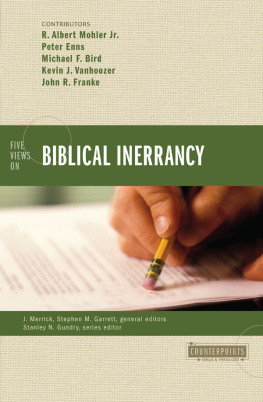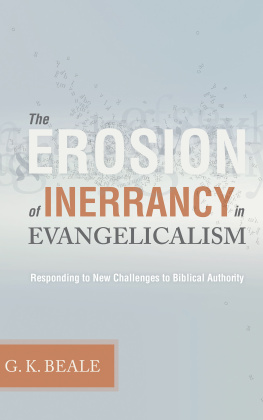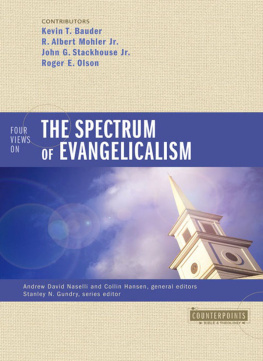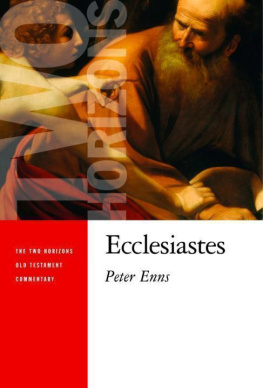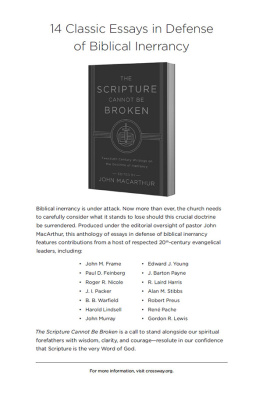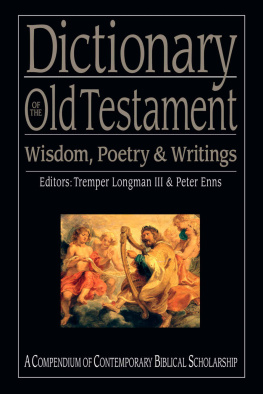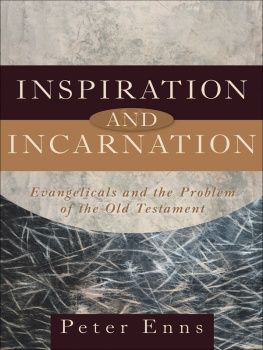R. Albert Mohler Jr. Peter Enns Michael F. Bird Kevin J. - Five Views on Biblical Inerrancy
Here you can read online R. Albert Mohler Jr. Peter Enns Michael F. Bird Kevin J. - Five Views on Biblical Inerrancy full text of the book (entire story) in english for free. Download pdf and epub, get meaning, cover and reviews about this ebook. year: 2013, publisher: Zondervan, genre: Religion. Description of the work, (preface) as well as reviews are available. Best literature library LitArk.com created for fans of good reading and offers a wide selection of genres:
Romance novel
Science fiction
Adventure
Detective
Science
History
Home and family
Prose
Art
Politics
Computer
Non-fiction
Religion
Business
Children
Humor
Choose a favorite category and find really read worthwhile books. Enjoy immersion in the world of imagination, feel the emotions of the characters or learn something new for yourself, make an fascinating discovery.
- Book:Five Views on Biblical Inerrancy
- Author:
- Publisher:Zondervan
- Genre:
- Year:2013
- Rating:3 / 5
- Favourites:Add to favourites
- Your mark:
- 60
- 1
- 2
- 3
- 4
- 5
Five Views on Biblical Inerrancy: summary, description and annotation
We offer to read an annotation, description, summary or preface (depends on what the author of the book "Five Views on Biblical Inerrancy" wrote himself). If you haven't found the necessary information about the book — write in the comments, we will try to find it.
Five Views on Biblical Inerrancy — read online for free the complete book (whole text) full work
Below is the text of the book, divided by pages. System saving the place of the last page read, allows you to conveniently read the book "Five Views on Biblical Inerrancy" online for free, without having to search again every time where you left off. Put a bookmark, and you can go to the page where you finished reading at any time.
Font size:
Interval:
Bookmark:
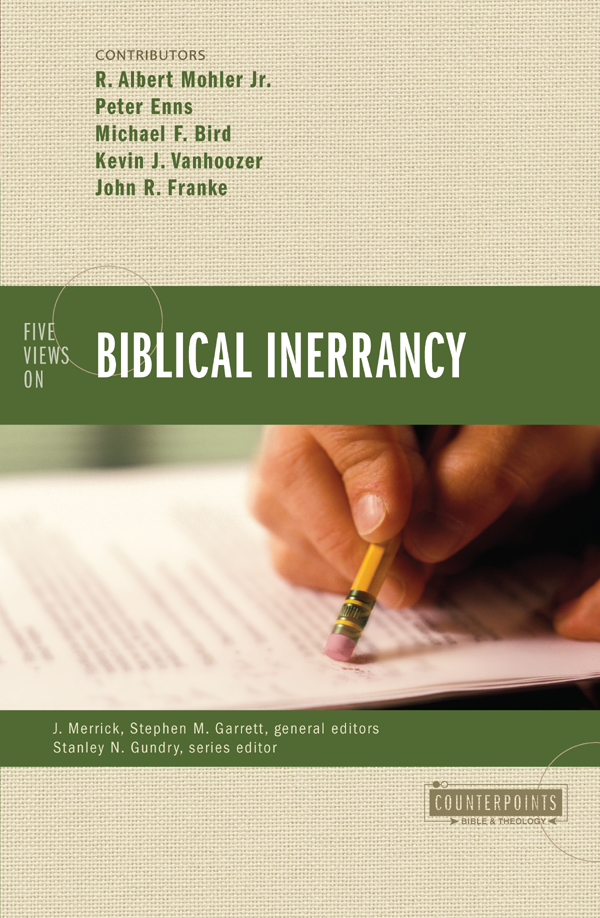
Stanley N. Gundry, series editor

T he Bible is central to evangelical faith and witness, and, for many evangelicals, inerrancy is crucial to securing the centrality of the Bible. Inerrancy has been commonly viewed as the doctrine upon which evangelicalism stands or falls. Perhaps the most obvious example is the doctrinal basis of the Evangelical Theological Society, which, until relatively recently, was just the doctrine of inerrancy (the doctrine of the Trinity was added in 1990). The assumption seemed to be that there was a direct correlation between believing in the accuracy of Scripture and reading Scripture accurately. When we approach Scripture in faith, we are motivated to harmonize apparent discrepancies and persist into historical or scientific data to see the vindication of the Bible. Challenges raised by critical scholarship are products not of the text but of suspicious scholars dissatisfied with or hostile to Scripture or Christianity.
Inerrancy, then, is not a mere statement about Scripture for evangelicals. Since Scripture is the source of evangelical faith, and since inerrancy is ultimately a matter of reading Scripture faithfully, inerrancy is often regarded as of the essence of genuine Christian faith. It should come as no surprise that inerrancy is resurfacing as evangelicalism is increasingly fragmented and contested, submerged between emergence and resurgence.
Our project is concerned that this link between inerrancy and evangelical identity can obscure the meaning of inerrancy and frustrate the vitality of evangelical faith. Because inerrancy is seen as the guarantor of evangelical identity, many of the conversations about it are negative in thrust, focusing more on what could be lost if inerrancy, or at least a certain version of inerrancy, is not maintained. Moreover, inerrancy is not simply a stand-alone doctrine; it is interconnected with others. Unfortunately, the electricity of the debate obscures these other doctrines, limiting the conversation and diminishing evangelical faith. There is great risk, then, that inerrancy may become the only cipher for a certain account of what it means to be an evangelical.
Accordingly, for the sake of the health of evangelicalism and the vibrancy of its faith, this book aims to concentrate not only on the doctrine of inerrancy but also on the key doctrines that inform what it means to say that Scripture is inerrant. In other words, we want to encourage conversation on the doctrinal rationale of inerrancy and its Scriptural warrant rather than on why it may or may not be detrimental to evangelicalism. For in the final analysis, our beliefs should be motivated by theological and biblical reasons rather than by sociological ones. Said simply, we should hold to inerrancy not because it secures evangelicalism but because it teaches evangelicals about God and how to put faith in him.
It might be helpful to begin by reflecting on what inerrancy means as a doctrine. In a scientific age such as ours, doctrines are often viewed as facts or as theories about biblical facts. As the scientist examines nature and formulates theories to explain its consistent behavior, so the theologian formulates doctrine that explains the data of Scripture. Yet, as we have already intimated, inerrancy is not merely a statement of fact but also a posture toward the Biblea way of reading the Bible, a criterion for what counts as faithful interpretation. Critical interpretations are often ruled out by inerrancy not always because the evidence to the contrary is compelling but also because such interpretations seem to exhibit a lack of confidence in God and the Bible.
This can be illustrated by recourse to one of perhaps the most prominent debates about inerrancy inside evangelicalism, the resignation of Robert Gundry from ETS in 1983.
Thus, in the following way, Geislers theological intuition was correct: inerrancy bears more than just a statement about Scripture. It bears several theological convictions, convictions about who God is and how God relates to and communicates in and through the text of Scripture.
It is important therefore to recognize from the Gundry-Geisler example that, as a doctrine, inerrancy communicates far more than simply an attribute of Scripture. It communicates a way of understanding God and a way of understanding ourselves before Scripture. It is therefore bound up with the whole of Christian teaching and cannot be properly understood apart from some discussion of its doctrinal setting. Such being the case, this book hopes to generate conversations on the doctrinal commitments that determine inerrancy.
We will have more to say about the doctrinal commitments and the nature of this book below. Before doing so, it is important to recognize the way in which inerrancy functions as doctrine and thus speak to the issue of where inerrancy should occur in a doctrinal system. It is not at all uncommon to find the confession of inerrancy at the head of the doctrinal statements of evangelical churches, ministries, and organizations. This of course has the benefit of declaring that what follows is reliable information, not merely the opinions of the people involved in the institution. Certainly, believers should be confident in their faith. But the question is, what kind of confidence, and what or who is the source of that confidence?
We wonder if there are some unintended consequences to misplacing the doctrine of inerrancy, that is, extracting it from its context of teaching about Holy Scripture and locating it at the beginning of a doctrinal statement. Placing inerrancy at the fount of doctrine can suggest things about the nature of doctrine itself. It can indicate that doctrines are merely facts or theories. Doctrine of course accords with reality, but it is not a mere fact.
The events which Christians proclaim are not events simply comparable to other historical events. They happen in history, but they are not merely historical. This is because the agent involved is not created but the Creator. Hence, the New Testament often describes events of our salvation as events of new creation (for example, John 1:1ff). The transformation effected in the events of Christian faith is rather different from a mere alteration of the general course of human history. What happens in Jesus Christ is nothing short of a reconstitution of the created order and the human being. Therefore, knowing the reality of Christ is not like knowing how the colonies won the Revolutionary War or the meaning of the Constitution of the United States. We can assimilate these truths into our repository of knowledge without much modification of ourselves or even our understanding of the world. Indeed, any aspect that may be challenging can be relativized: that was then; this is now.
But as Christians have recognized for two millennia, coming into contact with Christ involves repentance, a deep turning away from self and toward God. It involves abandoning some of our most commonsensical assumptions about what kind of place the world is, who we are, and what makes for a good life. The cross is a stumbling block (1 Cor. 1:23) and a cornerstone for a new form of humanity (Eph. 2:20) in which human enmity against one another and God is resolved (Gal. 3:28). To believe in Christ, in a certain sense, requires that we cease being realistic, for it requires us to see beyond the so-called necessities or realities of life in a fallen world and to let our faith in Christ ground a new way of life that takes seriously the presence of the kingdom of God.
Font size:
Interval:
Bookmark:
Similar books «Five Views on Biblical Inerrancy»
Look at similar books to Five Views on Biblical Inerrancy. We have selected literature similar in name and meaning in the hope of providing readers with more options to find new, interesting, not yet read works.
Discussion, reviews of the book Five Views on Biblical Inerrancy and just readers' own opinions. Leave your comments, write what you think about the work, its meaning or the main characters. Specify what exactly you liked and what you didn't like, and why you think so.

